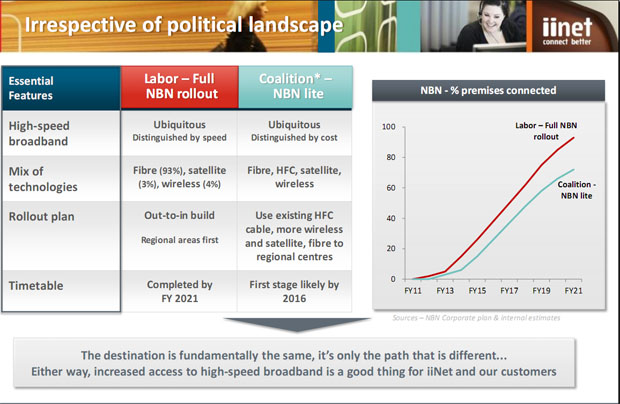iiNet predicts 27% cost drop on NBN

Internet service provider (ISP) iiNet has told investors that it expects to cut down its average cost per user by 27 per cent once all customers have been migrated onto the National Broadband Network (NBN).
iiNet has long complained about the high ADSL2+ port prices that Telstra charges its retail competitors in regional and remote areas of Australia, where the telcos do not have their own ADSL2+ equipment deployed. At the company's financial results last month, iiNet CEO Michael Malone said that Telstra charged telcos more for access to ADSL2+ ports than it charged end customers, and, as a result, the company had lost around 43,000 off-net customers in the last financial year.
In an investor briefing posted to the Australian Stock Exchange this morning, iiNet said that the average cost per user for off-net customers is currently $61 per month, compared to $36 per month for on-net customers. Across iiNet's total customer base, this was estimated to be an average cost per user of $46 per month. In an NBN world, however, iiNet expects this cost to decline 27 per cent to $34 per month.
In addition to this, the average margin per customer is expected to rise from $28 per month to $32 per month on the NBN.
These gains wouldn't be immediate, however, the company noted, as the NBN is scheduled to take 10 years to be completed. iiNet expects to have most of its off-net customers off Telstra's copper network and onto the NBN by 2019. Its on-net customers will begin migration in 2016. The company expects its total customer base to be on the NBN by 2021.
In the meantime, iiNet has committed to driving down its costs in regional Australia by deploying DSLAMs in places where the company can make back its investment in less than two years. The average cost to deploy a DSLAM is approximately $100,000 for the company.
iiNet has been a staunch supporter of the NBN project, but the ISP told investors that it believes that the coalition's broadband policy, labelled as "NBN lite", would also ultimately result in better access to high-speed broadband for Australians, although deployment for the coalition's broadband network would not likely begin until 2016.

(Screenshot by Josh Taylor/ZDNet Australia)
Earlier this week, iiNet joined rival telcos Internode and Exetel in unveiling planned pricing for services on the NBN. The prices were significantly cheaper than those on offer by the other providers, leading Internode to speculate that it would revise its own NBN pricing soon.
While NBN Co will begin charging telcos wholesale fees for serving customers in the first five release sites from 1 October, Telstra, Optus, Primus and TPG have so far been reluctant to reveal their own commercial pricing for NBN plans.